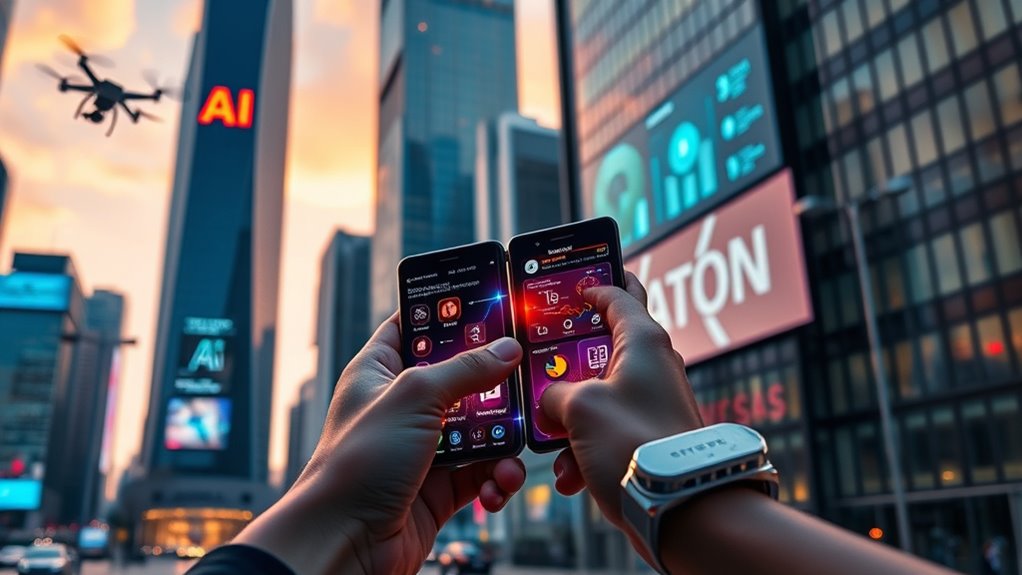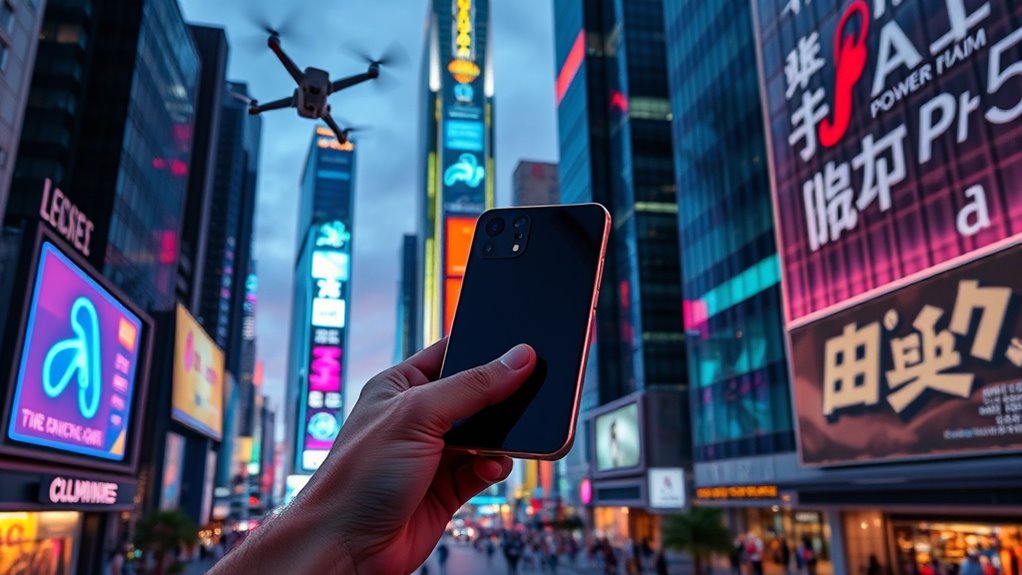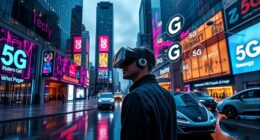In 2025, expect to see AI become smarter and more intuitive, seamlessly improving your daily interactions. Quantum computing will revolutionize industries, tackling complex problems faster than ever, while cybersecurity adapts with quantum-resistant tech. Foldable phones will enhance portability with larger, durable screens, and consumer gadgets will become more versatile and affordable. Autonomous vehicles will start transforming transportation, making travel safer and more efficient. Stay with us to uncover how these innovations will impact your world even further.
Key Takeaways
- AI will become more intuitive, powering smarter virtual assistants and fully integrated smart ecosystems.
- Quantum computing advancements will revolutionize industries and drive new cybersecurity measures.
- Foldable phones will grow in popularity, combining tablet and phone features in durable, affordable designs.
- Autonomous vehicles will approach mainstream adoption, transforming transportation and urban infrastructure.
- Cybersecurity will evolve with quantum-resistant algorithms and AI-driven threat detection to protect data.

Are you ready to see how technology will reshape our world in 2025? The landscape of innovation is accelerating faster than ever, and staying ahead means understanding the key trends that will define the year. Quantum computing stands out as a game-changer, promising to revolutionize industries by processing complex problems at lightning speed. Unlike traditional computers, which handle data sequentially, quantum computers use qubits to perform multiple calculations simultaneously. This leap will open breakthroughs in fields like material science, pharmaceuticals, and artificial intelligence. As quantum technology matures, expect to see it integrated into research labs and enterprise solutions, pushing the boundaries of what’s possible. But with this power comes new challenges, especially in cybersecurity. Cybersecurity innovations will be essential in protecting data in a quantum-enabled world. Traditional encryption methods might become obsolete, prompting the rise of quantum-resistant algorithms. These advanced security measures will be indispensable for safeguarding sensitive information across finance, healthcare, and government sectors. You’ll notice that cybersecurity becomes more proactive, leveraging AI-driven threat detection and zero-trust architectures to stay one step ahead of cybercriminals. The convergence of quantum computing and cybersecurity will shape a safer digital landscape, but it also requires you to be more vigilant than ever in your digital practices. Additionally, as quantum systems become more widespread, understanding computing power will be crucial for both consumers and industry professionals. Meanwhile, consumer tech will continue its evolution with foldable phones gaining popularity. These devices will offer larger screens in a compact form, making multitasking and media consumption seamless. Expect foldable phones to become more durable and affordable, encouraging more people to switch from traditional smartphones. The design will blur the lines between tablets and phones, giving you a versatile device that adapts to your needs. Alongside foldables, wearable tech will advance with smarter features, integrating health tracking and augmented reality into everyday accessories. Virtual and augmented reality will become more immersive, transforming how you work, socialize, and entertain yourself. AI-powered assistants will become more intuitive, anticipating your needs and providing personalized experiences that feel natural and effortless. Smart homes will evolve into fully integrated ecosystems, where your devices communicate seamlessly to optimize energy, security, and convenience. Autonomous vehicles will edge closer to mainstream adoption, transforming transportation and urban planning. All these trends point to a future where technology becomes more integrated into your daily life, making tasks easier, safer, and more engaging. Whether it’s through quantum breakthroughs, smarter cybersecurity, or innovative gadgets, 2025 will be a year that pushes the boundaries of what you thought was possible. Staying informed and adaptable will be your best tools to navigate this rapidly transforming world.
Frequently Asked Questions
How Will AI Impact Everyday Home Automation in 2025?
In 2025, AI will make your home smarter through advanced voice assistants and seamless smart home integration. You’ll easily control lights, thermostats, and appliances with just your voice, saving time and effort. AI will learn your routines, anticipating your needs and adjusting settings automatically. This will create a more comfortable, efficient, and personalized living environment, making daily tasks simpler and enhancing your overall home experience.
What Are the Environmental Implications of New Foldable Phone Materials?
You might worry that new foldable phone materials harm the environment, but they’re often made from recyclable materials designed for eco-friendly manufacturing. These innovations reduce waste and minimize resource extraction. By choosing sustainable options, you help lower the ecological footprint of tech products. As a result, your use of foldable phones becomes more environmentally responsible, supporting a greener future without sacrificing the convenience or innovation you love.
Will Quantum Computing Become Mainstream by 2025?
Quantum computing will likely become more mainstream by 2025, driven by recent quantum breakthroughs. You’ll see increased efforts towards computing integration, making quantum tech more accessible for industries like healthcare, finance, and cybersecurity. While full-scale adoption may still be a few years away, expect more practical applications and collaborations that push quantum computing into everyday use, transforming how you solve complex problems and process data.
How Secure Will Personal Data Be With Advancing AI Technologies?
Your personal data’s security could be more fragile than glass in the age of advancing AI. As AI becomes smarter, data privacy faces unprecedented threats, making it vital to stay alert. Strict AI regulations will be essential to protect your information, but gaps may still exist. You must actively monitor how your data is used and push for stronger safeguards to guarantee your privacy isn’t compromised by rapid technological leaps.
What Industries Will Be Most Transformed by 5G and Edge Computing?
You’ll see industries like smart agriculture and industrial automation transform rapidly with 5G and edge computing. Smart agriculture benefits from real-time data, enabling precise irrigation and pest control. Industrial automation becomes more efficient as machines communicate instantly, reducing downtime. These technologies enhance productivity, safety, and sustainability, revolutionizing how you operate and manage resources. Expect faster responses, smarter systems, and increased innovation in these sectors as 5G and edge computing become integral.
Conclusion
As you embrace 2025’s tech landscape, remember that just like Icarus soaring too close to the sun, pushing boundaries can lead to incredible heights—or unforeseen challenges. Stay curious and adaptable, for the innovations ahead are shaping a world where your fingertips hold endless possibilities. Keep your eyes open, and don’t forget: in this rapid evolution, those who innovate dare to fly higher, transforming dreams into reality—just like the legends that inspire us.









